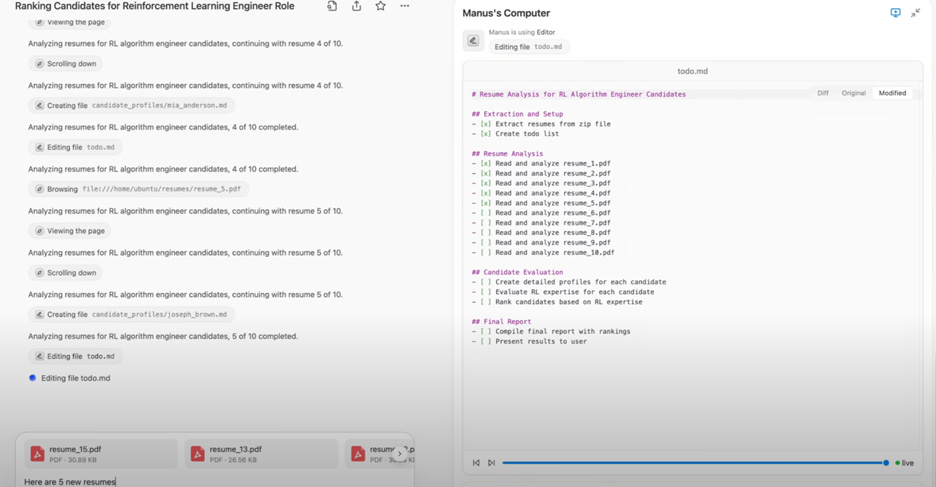Manus and the New AI Agents
Manus is the vanguard of next-generation AI agents. A flood of new AI agents is coming soon. Buckle up.
Manus Goes Viral
I’ve been meaning to write about AI agents for a while now, given the huge progress in AI agents recently. Now that the recently released Manus AI agent has gone viral, it offers me the opportunity to focus on this topic.
Manus is a general AI agent system released by Manus AI that works autonomously and asynchronously to execute a variety of tasks. It employs a multi-agent architecture that functions like an executive managing specialized sub-agents, breaking complex tasks into manageable components, assigning them to appropriate agents, and overseeing their progress.
Manus is distinguished by its ability to take initiative independently—it begins tasks autonomously, evaluates new data, and dynamically adapts its methodologies without continuous human guidance.
While Manus is not as unique as the hype suggests, it does represent the current frontier of what highly autonomous virtual agents can achieve. AI agent builders are cracking the next level of capabilities. We are at an inflection point, and 2025 will see a flood of highly capable AI Agents.
A new level of AI Agents
AI agents are autonomous AI systems designed to perceive their environment, make decisions, and take actions to complete specific tasks. Unlike traditional software or fixed AI workflows, AI agents adapt their behavior based on feedback from the environment, enabling them to navigate complex scenarios with minimal human intervention.
AI agents can execute tasks in either fixed or dynamic workflows:
In a fixed workflow, the structure of the task is pre-defined and doesn’t change.
In a dynamic workflow, intelligent planning is used to organize and execute task steps on the fly.
Overseeing dynamic workflows and more open-ended environments is clearly a much harder challenge. Fixed workflow AI agents are already here. For example, AI agent chatbots that respond to a limited set of queries, AI agents that generate code, and many RAG-based AI workflows.
Each new generation of AI models expands what AI agents can do. When GPT-4 was released 2 years ago, there was a flurry of excitement about AI agents. Many early AI agent systems were able to do interesting tasks, but they fell short of promises due to two issues: Lack of reliability and weak planning abilities.
The improved AI reasoning models have unlocked a new level of agentic AI.
Better AI reasoning unlocks “deeply useful” Deep Research AI tools that research and write thorough reports on requested topics. Better VLMs and tool connectors enable AI agents that can interact with and control the browser: Operator, Project Mariner, and Computer Use.
This is where Manus comes in. It’s using all the latest AI model capabilities to the hilt to build a next-level AI agent: general, flexible, highly performant.
Meet Manus, Your Virtual Right Hand
“Manus isn’t just another chatbot or workflow. It’s a completely autonomous agent that bridges the gap between conception and execution. … We see it as the next paradigm of human-machine collaboration.” - Yichao “Peak” Ji, research lead for Manus AI
Manus is an advanced autonomous AI agent system from the Chinese startup Monica.im. The Manus demo video bills itself as ‘the first general AI agent’ and showed off some powerful capabilities:
When given a zip file of resumes, Manus doesn't simply rank candidates; it comprehensively reviews each document, extracts relevant skills, cross-references them with market trends, and delivers optimized hiring recommendations, including autonomously created supporting materials.
Manis conducted research based on multiple criteria, analyzed articles, wrote Python programs, filtered listings, and compiled detailed reports.
Manis performed correlation analysis, accessed data sources, wrote code for analysis and visualization, and created interactive data visualization websites.

This is all very impressive. Deep Research can do much of the research task, but the fact that Manus can write code to support a research query makes it more general and more powerful. Data analysis and visualization can be accomplished with AI help from Google Data Science Agent in Colab, but not fully autonomously.
The use-cases go beyond those in their gallery: Trip planning, content creation (websites, courses), complex data analysis with data dashboards and visualization outputs, shopping tasks, and more. There is a ‘sweet spot’ of best real-world use-cases for AI agents, and Manus hits them all.
Manus coordinates web browsers, APIs, and document editors to accomplish user goals. The Manus architecture is not public, but an enterprising user pried it out; Manus has Claude sonnet, browser use and 29 other tools under the hood.
Manus plans and executes tasks end-to-end, acting as a digital executive assistant. Unlike conventional interactive AI assistants, Manus uses cloud-based asynchronous operation, executing tasks in the background and notifying users only when results are ready. In this way, Manus can address multi-step workflows that previously required multiple manually integrated AI tools.
If it lives up to billing and is reliable enough, Manus represents a genuine milestone in improved general AI agents that function with minimal supervision.
However, I get "Devin" vibes from this Manus release announcement. A Chinese (American?) nerd presents an amazing useful tool that supposedly works like magic to automatically solve hard problems. Poof, virality happens. Wasn’t that Devin? No, wait, it was Rabbit, right?
Manus Reviewed
I’d like to try out Manus myself to calibrate hype versus reality, but it’s waitlisted. I’ll have to defer to reports from early users. Social media reactions show a lot of excitement and mostly positive experiences, but there are also some failed experiences.
Manus is out of control said Wes Roth in his video review. He was "blown away" by Manus's capabilities, including features like navigating an Ubuntu terminal, noting that Manus shares a similar work layout to Devin. Wes praised its autonomous ability to create websites ("absolutely glorious"), develop courses (“thorough”), and conduct research effectively. He was excited enough to declare the start of the autonomous AI agent era.

Manus probably isn’t China’s second ‘DeepSeek moment,’ says TechCrunch with a more cautious review. They note the hype – a discord server with 138,000 members added in days – and the glowing reviews:
The head of product at Hugging Face called Manus “the most impressive AI tool I’ve ever tried.” AI policy researcher Dean Ball described Manus as the “most sophisticated computer using AI.”
They also note examples of failures. The author tried it one some tasks, but it crashed:
I asked the platform to handle what seemed to me like a pretty straightforward request: order a fried chicken sandwich from a top-rated fast-food joint in my delivery range. After about ten minutes, Manus crashed. On the second attempt, it found a menu item that met my criteria, but Manus couldn’t complete the ordering process — or provide a checkout link, even.
Ashutosh Shrivastava’s review of Manus praises its research reports as “incredible” and its “ability to run scripts behind the scenes to execute tasks” as impressive, but he also notes that it is slow, breaks when overloading context, and can get stuck on some tasks.
Ethan Mollick found Manus to be “Devin-like” and said:
Finally had a chance to try Manus. It's a Claude wrapper, but a very clever one. Runs into the same issues as general agents, including getting stuck, but also capable of some good stuff.
The AI Agent Future
One last Manus review by Forbes says “Manus changes everything.” Wait, that’s my line.
I’m more tempered. Manus is still in beta, it’s not perfect, and demo hype hides the perennial flaw of AI agents: They are unreliable and fragile.
Still, Manus is an exemplar of the next generation of AI agents, and as such is a glimpse into the near future. Just like DeepSeek R1 showed that AI reasoning models were here to stay, Manus is a signal we are at an AI Agent inflection point. AI is moving up from just a thinking partner to autonomous AI “executors” that get things done.
The rise of agentic AI systems that can autonomously plan and act is driving the development of AI agent frameworks and emerging interoperability standards to build and orchestrate AI agents. We will address these AI agent ecosystem topics in upcoming articles.




